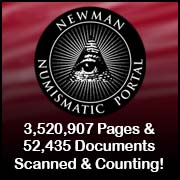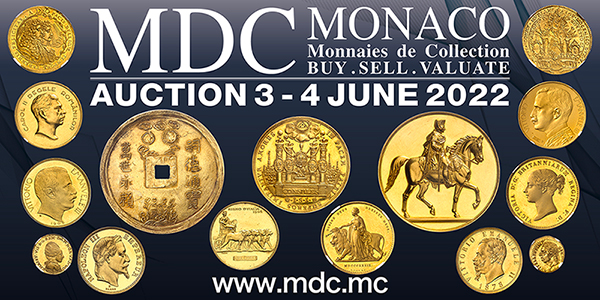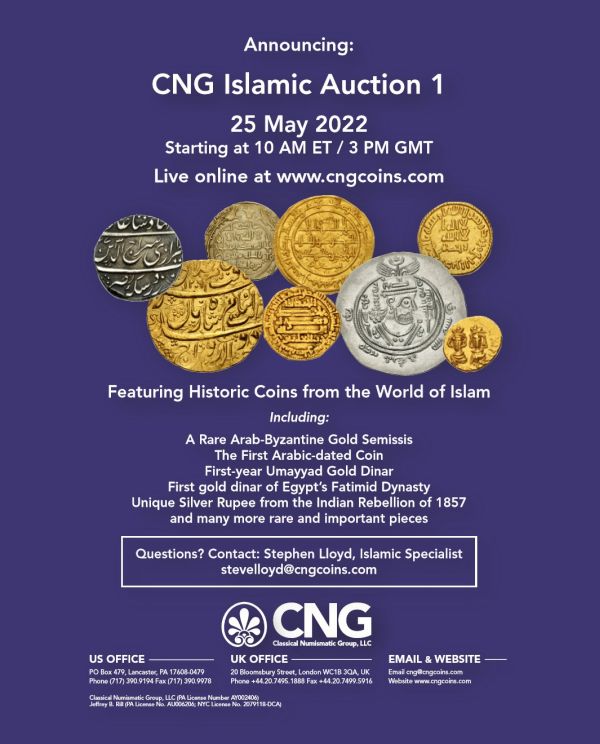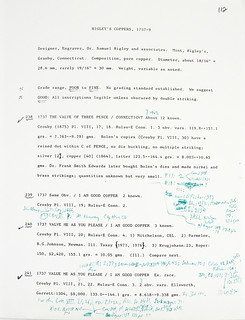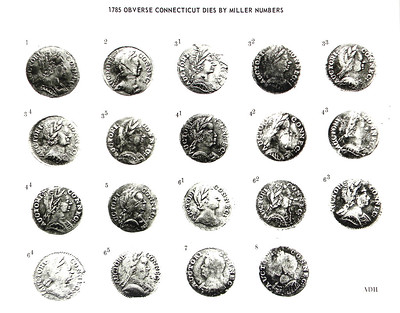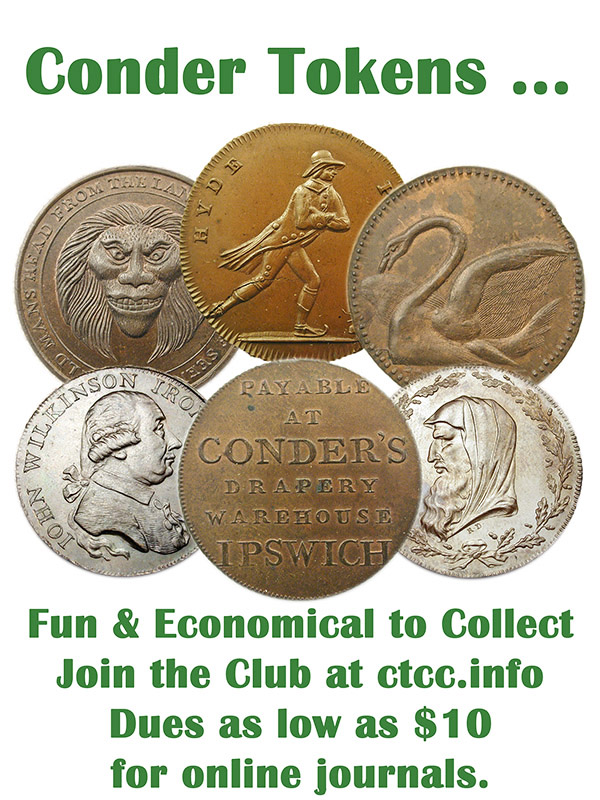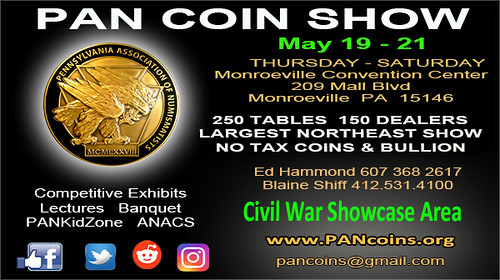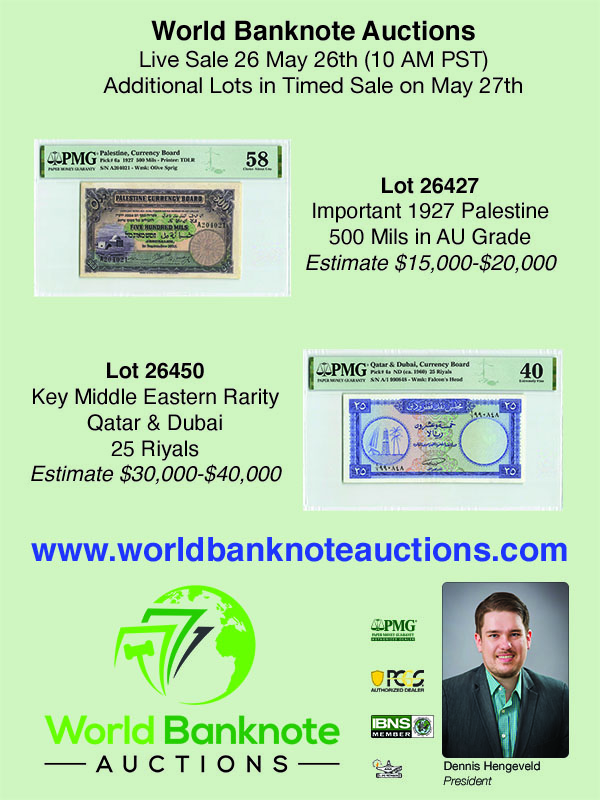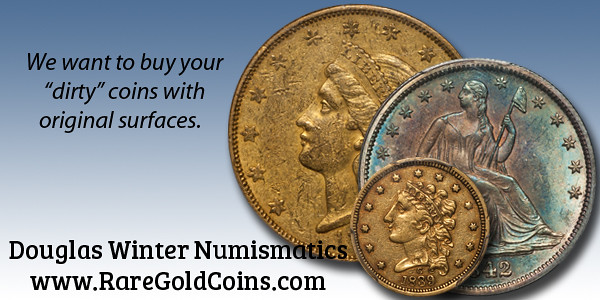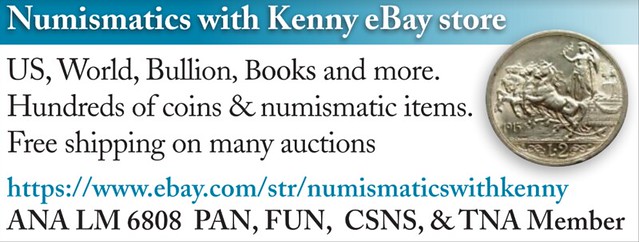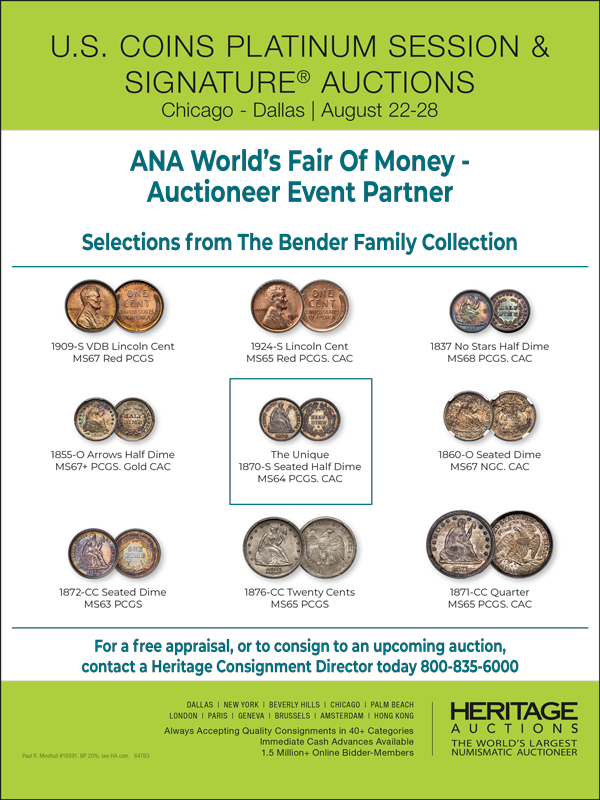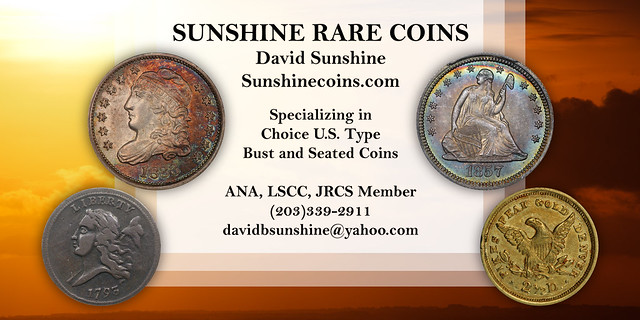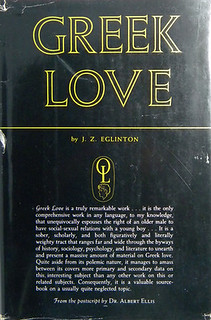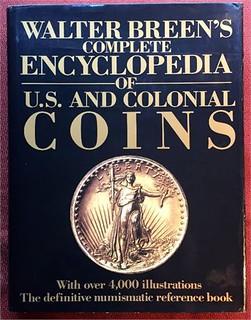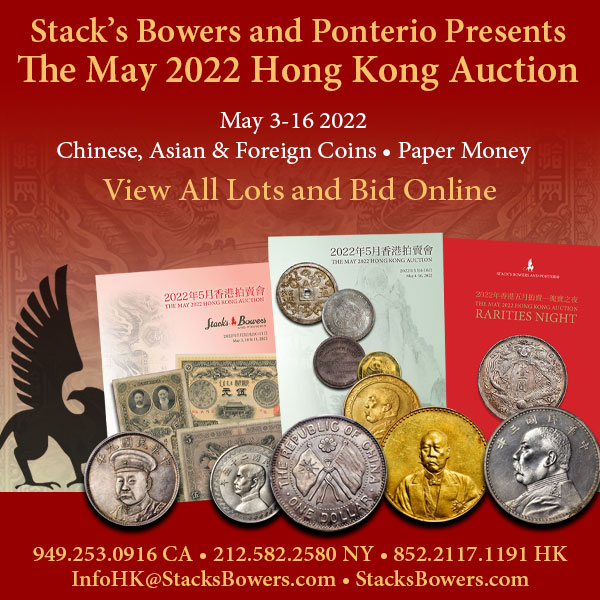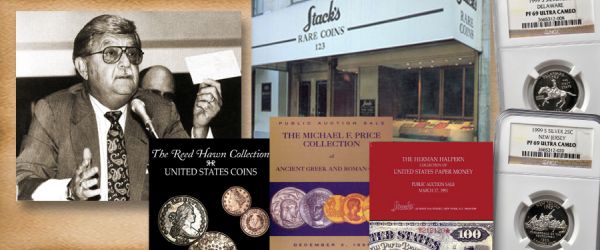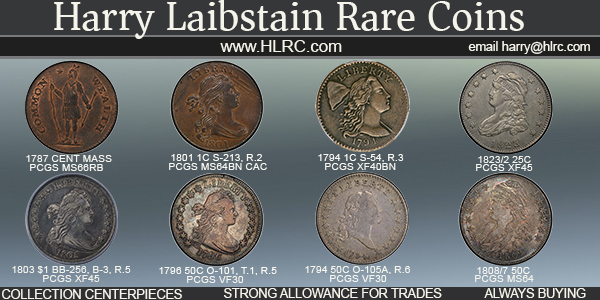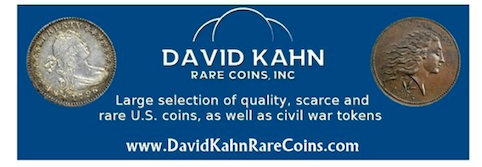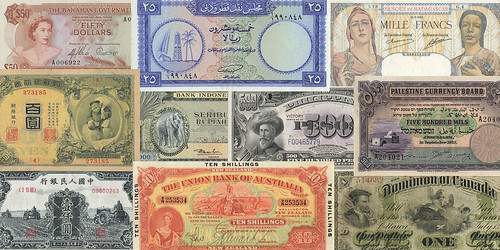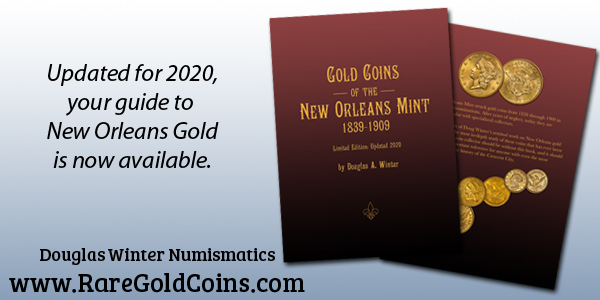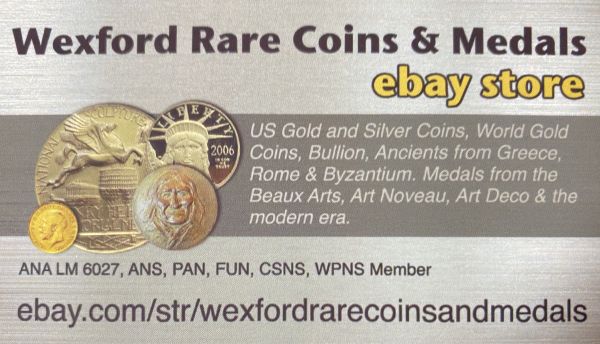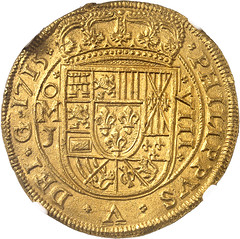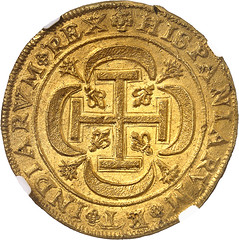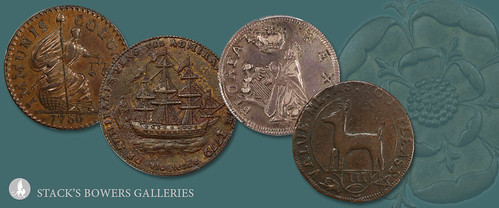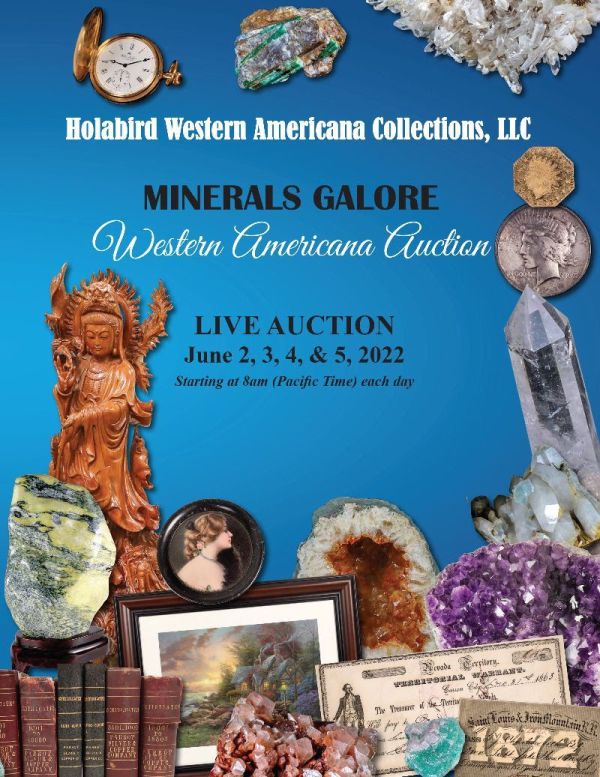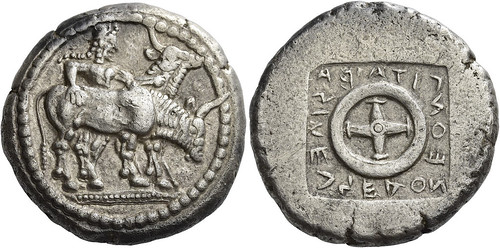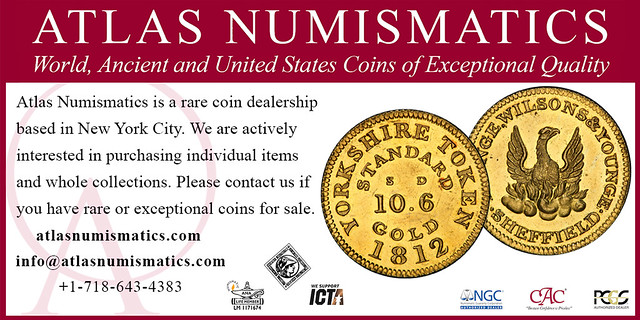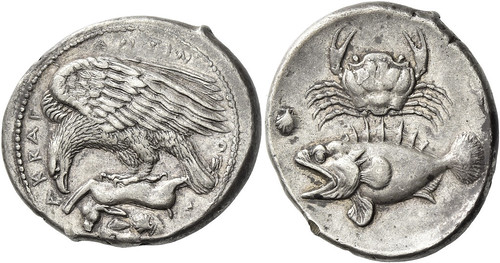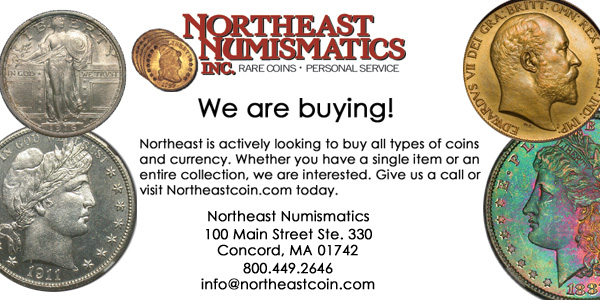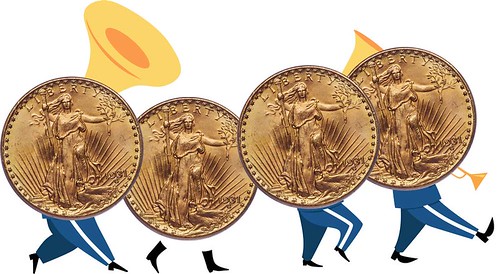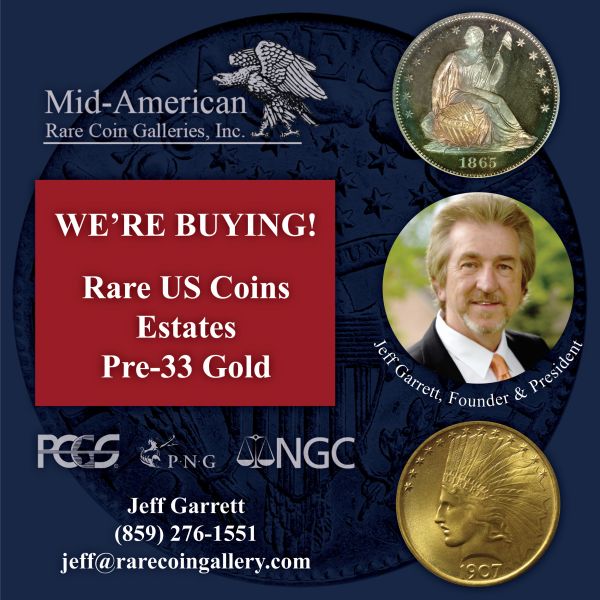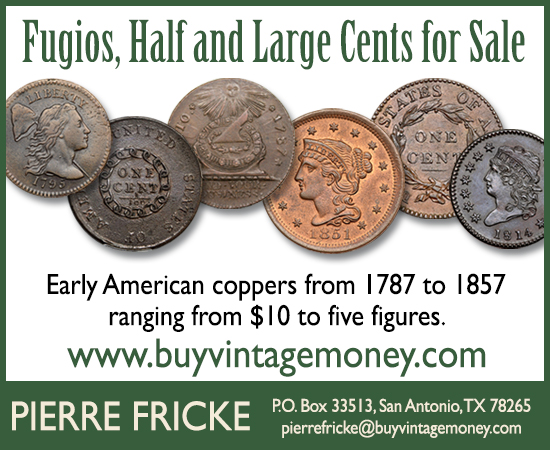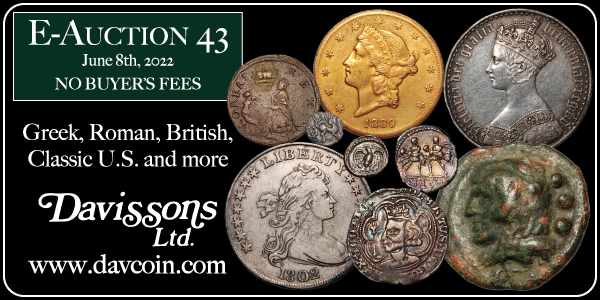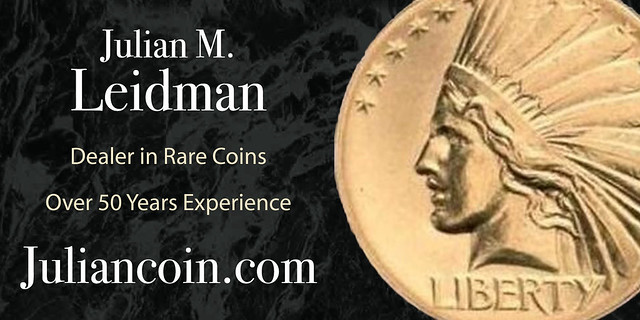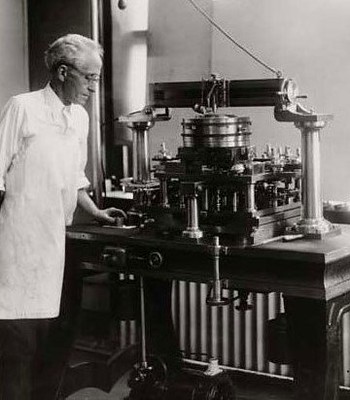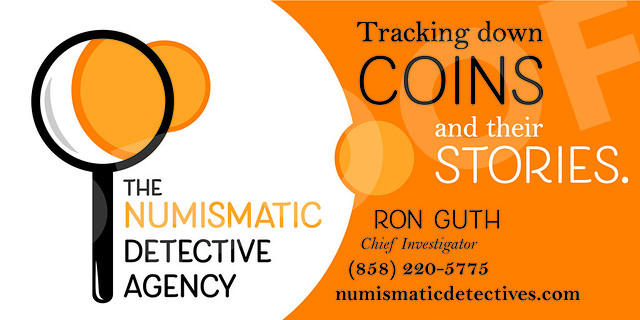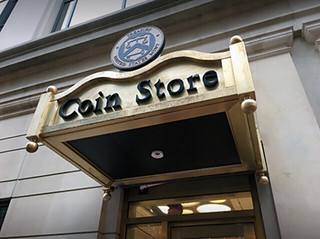
Visit our NBS Sponsors


About UsThe Numismatic Bibliomania Society is a non-profit association devoted to the study and enjoyment of numismatic literature. For more information please see our web site at coinbooks.org SubscriptionsThose wishing to become new E-Sylum subscribers (or wishing to Unsubscribe) can go to the following web page link MembershipThere is a membership application available on the web site Membership Application To join, print the application and return it with your check to the address printed on the application. Print/Digital membership is $40 to addresses in the U.S., and $60 elsewhere. A digital-only membership is available for $25. For those without web access, write to: Charles Heck, Treasurer AsylumFor Asylum mailing address changes and other membership questions, contact Chuck at this email address: treasurer@coinbooks.org SubmissionsTo submit items for publication in The E-Sylum, write to the Editor at this address: whomren@gmail.com BUY THE BOOK BEFORE THE COINSale CalendarWatch here for updates! |
- WAYNE'S WORDS: THE E-SYLUM MAY 20, 2022
- SOLIDUS 8TH NUMISMATIC LITERATURE SALE
- SIMMONS GALLERY MAY 2022 BOOK AUCTION
- MANLEY GIVES BREEN DOCUMENTS TO ANA LIBRARY
- NEWMAN PORTAL ADDS MUSICA IN NUMMIS
- VIDEO: COLLECTING ANCIENT COINS
- HELPING LOCAL COIN CLUB NEWSLETTER EDITORS
- NOTES FROM E-SYLUM READERS: MAY 20, 2022
- SIXBID NOW AVAILABLE IN EIGHT LANGUAGES
- A LIFE IN THE RARE BOOK TRADE
- A LIFE IN THE RARE COIN TRADE
- VOCABULARY TERM: INSERT DIE
- ROBERT BASHLOW, PART THREE
- HARVEY STACK'S NUMISMATIC FAMILY, PART 121
- MIKE CASTLE, COINAGE CONGRESSMAN
- WORLD BANKNOTE AUCTIONS SALE 26
- MDC MONACO JUNE 2022 AUCTION
- 1715 FLEET SPANISH PHILIPPE V ROYAL 8 ESCUDOS
- STACK'S BOWERS TO OFFER SYD MARTIN COLLECTION
- NUMISMATIC NUGGETS: MAY 20, 2022
- A CLASSIC AGRIGENTUM TETRADRACHM
- BETTER-DATE SAINT GAUDENS MARKET INTEREST
- MICHAEL ARMITAGE TO DESIGN NEW POUND COIN
- FAKE CANADIAN FAKE TWO-DOLLAR COINS SEIZED
- LEPROSY COINS
- ISRAEL PRESENTATION MEDALS
- FINDING AN OLD SAFE
- THE GEOMETRIC LATHE
- MAKING ART OUT OF INFLATION
- LOOSE CHANGE: MAY 20, 2022
- FEATURED WEB SITE: RNUMIS
Click here to read the thin version on the web
Click here to subscribe
Click here to access the complete archive
To comment or submit articles, reply to whomren@gmail.com
Content presented in The E-Sylum is not necessarily researched or independently fact-checked, and views expressed do not necessarily represent those of the Numismatic Bibliomania Society.
WAYNE'S WORDS: THE E-SYLUM MAY 20, 2022
 New subscribers this week include:
Terry Campbell, courtesy Allan Julius Behul;
Hondo Davids, courtesy O. T. Thompson;
Nathan Deinlein and Dalton Jenkins, courtesy Bill Rosenblum; and
Marie Gibbs.
Welcome aboard!
New subscribers this week include:
Terry Campbell, courtesy Allan Julius Behul;
Hondo Davids, courtesy O. T. Thompson;
Nathan Deinlein and Dalton Jenkins, courtesy Bill Rosenblum; and
Marie Gibbs.
Welcome aboard!
Thank you for reading The E-Sylum. If you enjoy it, please send me the email addresses of friends you think may enjoy it as well and I'll send them a subscription. Contact me at whomren@gmail.com anytime regarding your subscription, or questions, comments or suggestions about our content.
This week we open with two numismatic literature sales, donations to the ANA Library, updates from the Newman Numismatic Portal, and more.
Other topics this week include Musica in Numis, coin club newsletter editing, Sixbid, young people entering the rare book and coin trades, Mike Castle, auction previews, Saint Gaudens double eagles, a new pound coin design, fake toonies, and leprosy coins.
To learn more about the Schulz coin cabinet, wedding medals, insert dies, Robert Bashlow, Lynn Glaser, the Donald R. Shasky Collection of silver three-cent pieces, the "Royal" gold 8 escudos, the King Getas Octodrachm, the Year of the Monkey note, Israel presentation medals, the geometric lathe, and the U.S. Mint coin store, read on. Have a great week, everyone!
Wayne Homren
Editor, The E-Sylum
SOLIDUS 8TH NUMISMATIC LITERATURE SALE
The Munich firm Solidus is offering their 8th sale of numismatic literature on May 29, 2022. Here are some selected lots that caught my eye, with Google-translated descriptions. See the complete sale online. -Editor
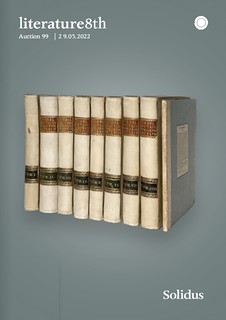 Literature Auction 99 (Rarities) - 29.05.2022 17:00
Literature Auction 99 (Rarities) - 29.05.2022 17:00
Selected numismatic literature with many rarities and bibliophilic treasures of the 17th and 18th century including parts of the library of a book-lover.
A pdf-file with all lot texts of the auction can be downloaded on the website of Solidus (menu auctions).
A link for viewing the illustrated print catalogue is available on the website of Solidus too (menu auctions).
SIMMONS GALLERY MAY 2022 BOOK AUCTION
Simmons Gallery in London is also holding a numismatic literature sale this month. Here are some selected lots. -Editor
The library of the late Scottish collector Andrew Macmillan is being auctioned by Simmons Gallery on Tuesday 17 May online only from 12 noon.
His interests were in all things Scottish, with a particular emphasis on church communion tokens. This library is probably the the best for such humble tokens and their historical background. Some items are annotated photocopies of the hardbacks also offered here, many rare or scarce to find. Start prices are low and everything has to go!
MANLEY GIVES BREEN DOCUMENTS TO ANA LIBRARY
This press release highlights a new donation to the ANA Library by its benefactor and namesake Dwight Manley. -Editor
Receives Important Donation From Dwight N. Manley
Walter Breen's Documents Can Help Future Researchers
NEWMAN PORTAL ADDS MUSICA IN NUMMIS
The latest addition to the Newman Numismatic Portal is Musica in Nummis. Project Coordinator Len Augsburger provided the following report. -Editor
German Numismatic Musicians
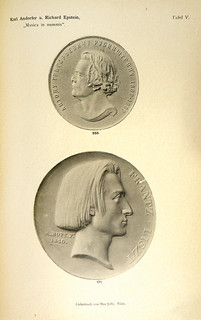 A Newman Portal user asked if we had the volume Musica in Nummis (1907) by Karl Andorfer and Richard Epstein. The answer was no, but we were able to locate it on a public domain site and add it to our collection. The work, in German, is a compilation of 984 medals with musical themes and includes 9 plates. The effort is obviously akin to Jay Galst's Ophthalmologia in Nummis and other numismatic works that specialize in a single (non-numismatic) subject.
A Newman Portal user asked if we had the volume Musica in Nummis (1907) by Karl Andorfer and Richard Epstein. The answer was no, but we were able to locate it on a public domain site and add it to our collection. The work, in German, is a compilation of 984 medals with musical themes and includes 9 plates. The effort is obviously akin to Jay Galst's Ophthalmologia in Nummis and other numismatic works that specialize in a single (non-numismatic) subject.
In cataloging this item, we learned that Paul Niggl acquired the collection that formed the basis for the 1907 work and expanded it over time. Niggl published an updated version of the catalog in 1965, entitled Musiker-Medaillen and now including 2,349 items. Niggl's collection was sold in a single lot by Spink and Son (July 14, 1998, lot 403), and appeared again, in multiple lots, in a November 2008 Baldwin sale.
We had to ask our favorite German-speaking numismatic musician if they were aware of this collection, and the answer was surprisingly no.
Image: Plate V from Musica in Nummis
Link to Musica in Nummis on Internet Archive:
https://archive.org/details/musicainnummis/page/n1/mode/2up?view=theater
VIDEO: COLLECTING ANCIENT COINS
These are selections from the David Lisot Video Library that feature news and personalities from the world of coin collecting. David has been attending coin conventions since 1972 and began videotaping in 1985. The Newman Numismatic Portal now lists all David's videos on their website at:
https://nnp.wustl.edu/library/multimediadetail/522852
Here's one with dealer David Rifkin on collecting ancient coins. -Editor
Coin Dealer Promotes Ancient Coin Collecting to Collectors and Kids.
VIDEO: 5:09.
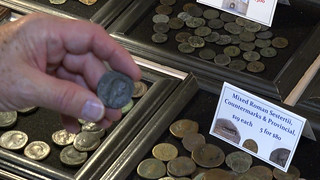 David Rifkin, Tiber Numismatics,
David Rifkin, Tiber Numismatics,
David Lisot, Interviewer, CoinTelevision.com.
April 1, 2022.
Everyone realizes that new coin collectors are needed to keep the hobby strong. Some dealers work harder than others to promote numismatics. Coin dealer David Rifkin enjoys sharing ancient coin collecting with other coin dealers, collectors and kids.
David adds:
"Ancient coin collecting can be a challenge for most people because they think it is too expensive and difficult to learn. This video will show this is not so!"
An excerpt of the video is available for viewing on the Coin Television YouTube Channel at:
https://youtu.be/Xi9yH1XvLaM
HELPING LOCAL COIN CLUB NEWSLETTER EDITORS
Paul Kluth edits the E-Gobrecht, an email newsletter for members of the Liberty Seated Collectors Club. In the May 2022 issue, he reported on a new effort to assist Editors of Local Coin Club Newsletters. With permission, we're republishing his notes here. Thanks, and good luck to all! Great project. -Editor
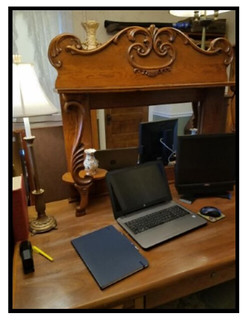 It has long been recognized that local coin
clubs across the country are generally focused
on growing interest in the numismatic hobby
within their communities, providing a social
activity for members and sharing knowledge
and experiences among colleagues besides the
typical buying, selling and trading of coins and
currency among members.
It has long been recognized that local coin
clubs across the country are generally focused
on growing interest in the numismatic hobby
within their communities, providing a social
activity for members and sharing knowledge
and experiences among colleagues besides the
typical buying, selling and trading of coins and
currency among members.
Three other areas of endeavor in particular always seem to be a top priority for most clubs whether they are small or large in membership size, regional in nature, or are of a specialty area focus (like Liberty Seated series collecting)
NOTES FROM E-SYLUM READERS: MAY 20, 2022
More on the Stunning Restrike Continental Dollar Die Sale
Regarding the recent Heritage six-figure sale of the restrike Continental Dollar die from the Fred Weinberg collection, Fred writes:
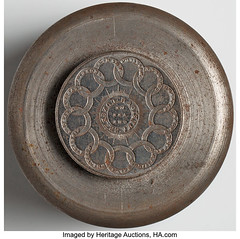 "I'm just as stunned as everyone else - I've been assured by Heritage that the winning bidder is a serious client of theirs, and I was also contacted by another dealer who has this winner as a good customer, and they just wanted to know any background about the die - which I could not provide.
"I'm just as stunned as everyone else - I've been assured by Heritage that the winning bidder is a serious client of theirs, and I was also contacted by another dealer who has this winner as a good customer, and they just wanted to know any background about the die - which I could not provide.
"I bought the die in the early '80's, I believe (not sure), and I cannot recall where or who I purchased it from - I had a variety of different ones I picked up over my 50 years as a dealer."
To read the earlier E-Sylum article, see:
CONTINENTAL DOLLAR RESTRIKE DIE SELLS BIG!
(https://www.coinbooks.org/v25/esylum_v25n19a11.html)
Other topics this week include Dickeson Continental Dollar restrikes, Bernard Ross Hansen, and the "Tender" edge-engraved cents. -Editor
SIXBID NOW AVAILABLE IN EIGHT LANGUAGES
I don't know how all the major U.S. auction sites handle localization, but this press release notes that the Sixbid platform is now available in six additional languages beyond the original German and English. -Editor
Sixbid Now Available in Six Additional Languages
Since 26 April 2022, Sixbid has also been available in Chinese, French, Italian, Japanese, Russian and Spanish.
THE BOOK BAZARRE
A LIFE IN THE RARE BOOK TRADE
Mike Costanzo writes:
"The enormous multiplication of books in every branch of knowledge is one of the greatest evils of this age."
-Edgar Allen Poe, 1842
This quote is mentioned in The Last Bookseller, A Life in the Rare Book Trade by Gary Goodman (2021), and firmly cements my conclusion that Edgar Allen Poe would have never become a member of the NBS, much less a happy one. Aside from numismatic-related books, I occasionally indulge myself by reading of the joys and sorrows of book collecting and book-selling. Commonly referred to as "books about books," these tomes provide companionship, not to mention comfort, to those of us who enjoy spending quality time with a book, as well as those in the heated throes of assembling the perfect library. After years of serious book buying, it seems only natural to want to get into the lives (and heads) of those who supply us with our cherished reading matter.
Despite the brick and mortar bookshop becoming a vanishing breed, there are those who still forge ahead and go out on a financial limb to live the dream. While I make most of my book purchases on-line, there's still nothing like browsing in a bookstore. Accidents happen here, and you can stumble upon something you weren't looking for, much less even knew existed. As musician David Bowie once observed, "You always find the book you didn't know you wanted" at a book store.
A LIFE IN THE RARE COIN TRADE
As noted in other articles recently, there is also noticeable interest among young people for the rare coin trade, an encouraging sign for the future of the hobby and business (bless you, Witter Coin University). Patrick Heller wrote a piece on Numismatic News encouraging students to work at a coin dealership. Here's an excerpt - see the complete article online. -Editor
Over the decades, the company where I work has hired dozens of middle school, high school and college students. About half of them have gone on to entrepreneurial careers. Several have become coin dealers either at this company or elsewhere. Others have become a certified public accountant, attorney, international sales, bank loan officer, florist or jeweler. The percentage of student employees who have gone on to entrepreneurial careers is many times higher than the overall average.
VOCABULARY TERM: INSERT DIE
Here's another entry from Dick Johnson's Encyclopedia of Coin and Medal Terminology. I've added images from an earlier E-Sylum article of a medal found on Ben Weiss' Historical Art Medals site. Thanks again! -Editor
Insert Die. A special die and its supplemental part – an insert – employed to produce raised lettering on a medal. The die to contain the insert is machined with a cavity by a tool and diemaker. The cavity is somewhat boat shaped with bevel sides. The insert blank is made of steel, also by a tool and diemaker it is shaped to fit the cavity in the insert die The insert blank is then engraved incuse by a hand or machine engraving to contain the desired lettering. During striking the insert lies loose in the base die – only one side of a medal may have an insert and this die must be in the lower position in the press (it would fall out of the die in the upper position). Raised lettering is produced by this method, but always a tiny raised ridge outlining the insert appears as flash on a piece so struck; this line is diagnostic of the use of an insert. It may be removed by chasing on the struck piece if considered too obvious and unwanted.
ROBERT BASHLOW, PART THREE
American Numismatic Biographies author Pete Smith submitted the third of his articles on Robert Bashlow, known in numismatics for, among other things, creating satirical medals and restrikes of the Confederate cent. Thanks. WARNING - there is some disturbing content here. -Editor
In the third installment, I will discuss Robert Bashlow and Walter Breen. Walter Breen was working with Dr. William H. Sheldon at Columbia University in the 1950's. One result was the 1958 publication of Penny Whimsy, the revision of Sheldon's 1949 book, Early American Cents, the work that gave us all the 70 point grading system.
HARVEY STACK'S NUMISMATIC FAMILY, PART 121
Stack's Bowers has a backlog of the late Harvey Stack's numismatic memoir articles and will continue publishing them. In this one Harvey discusses auction sales of 1995. -Editor
On the auction front, 1995 was a very important and active year for Stack's as we cataloged and presented nine separate auctions. These sales contained large and important collections of United States coins from colonials to modern issues as well as coins of the ancient world and foreign issues.
MIKE CASTLE, COINAGE CONGRESSMAN
I've long known of Congressman Mike Castle's role in coinage legislation. Recently NGC rolled out new certification labels featuring his signature, and the announcement has a nice overview of his contributions to the hobby. Here's an excerpt - see the complete article online. -Editor
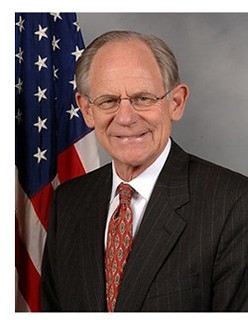 Castle was Delaware's at-large representative in the House from 1993 to 2011, after serving two terms as governor. While in Congress, Castle wrote and/or sponsored the bills that created the 50 State Quarters® program, the Sacagawea Dollar, the Presidential Dollar Series, the American Platinum Eagle, the America the Beautiful Quarters® program and a number of modern commemoratives — becoming known as
Castle was Delaware's at-large representative in the House from 1993 to 2011, after serving two terms as governor. While in Congress, Castle wrote and/or sponsored the bills that created the 50 State Quarters® program, the Sacagawea Dollar, the Presidential Dollar Series, the American Platinum Eagle, the America the Beautiful Quarters® program and a number of modern commemoratives — becoming known as The Coinage Congressman.
It is estimated that 150 million Americans — half of the country's population at the time — became casual coin collectors because of 50 State Quarters program, which raised nearly $7 billion in profit for the federal government. Many would become more serious modern coin collectors, which had a transformative effect on the hobby and propelled modern coin collecting into the juggernaut that it is today.
WORLD BANKNOTE AUCTIONS SALE 26
Here's the press release for World Banknote Auctions upcoming Live Sale 26. More great notes! -Editor
World Banknote Auctions has now listed Live Sale 26 on its website, which closes in two different segments. The first segment, the traditional live sale, closes on May 26th, 2022, with live bidding that day at 1 PM Eastern / 10 AM Pacific. The following day, on May 27th at 1 PM Eastern / 10 AM Pacific an additional segment closes in a timed auction (no live bidding, although lots may be extended if a bid is received 10 minutes before closing). Live Sale 25 offers a total of 936 lots from around the world, with highlights including a strong middle eastern selection, including the key note for Qatar & Dubai, as well as a strong selection of other items for both the beginning and advanced collector. Some highlights are selected below but the entire catalog can be viewed on the company's website, www.worldbanknoteauctions.com
MDC MONACO JUNE 2022 AUCTION
Here's the press release for the June 2022 sale from MDC MONACO. Great coins and medals!! -Editor
On June 3rd and 4th, an auction of collector's coins and medals will take place in Monaco. Indeed, 1267 lots from Antiquity to today will be presented for all over the world. The sale will be conducted by the expert Nicolas Gimbert in the salons of ONE MONTE-CARLO.
Several remarkable sets will be presented:
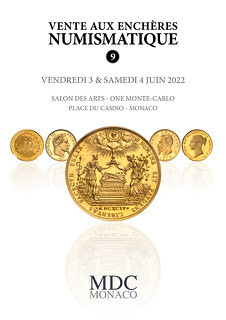
- A beautiful selection of ancient coins, Greek and Roman, as well as a collection of Gallic coins.
- For French coins, several great rarities will be offered for sale: a Royal d'Or of Louis IX, a Franc à Cheval of Charles VII or an exceptional medallion of Louis XIII and Marie de Medici in gold.
- Among the foreign coins, we note a nice set of Chinese coins, rarities for Great Britain, Mexico, or Romania, etc...
- For Italy and Venice, we must note a collection of gold oselles (multiples of gold offered directly by the doge), some of them struck in Murano, among the most beautiful known.
A prestigious 408-page catalog with numerous enlargements and historical comments will be available. LIVE participation will be possible on the BIDDR.CH platform.
1715 FLEET SPANISH PHILIPPE V ROYAL 8 ESCUDOS
A rare "Royal" 8 escudos from the 1715 Fleet is offered in the June 3-4 MDC Monaco auction. Here's a standalone article I excerpted from the press release. A great item. See the earlier article for more information on the sale. -Editor
Lot 1110.
Philippe V (1700-1746). Royal
8 escudos (special strike) from the Spanish silver fleet of 1715, Mexico.
Obv. *PHILIPPVS* V* DEI* G* (date)*. Crowned arms of Castilla and Leon, Catalonia, Aragon, Sicilia, Austria, Burgundy, Brabant, Flanders, Tyrol and Bourbon, surrounded by *(mint) (assayer) and *VIII*
Rev. *HISPANIARVM* INDIARVM* REX. Cross potent, lilies in each angle pointing to the center, in a quatrefoil surrounded by four tulips.
Aureo 2196 – Cal.291 – Cayon.9950 – Onza.401 – KM.R57.3 – Fr.7 ; Gold – 27 g – 35 mm – 12h. This is the second highest graded by NGC, the first one graded MS66 and this one MS62, coming from a Spanish silver fleet's wreck of 1715.
NGC MS62 (Shipwreck certification). Big rosettes' variety on the reverse. Letter J for José Eustaquio de Leòn, assayer. Very rare, with only 5 known examples and for a recently discovered date. Assay's traces on the edge with minor marine corrosion on the surface (certified by NGC, coming from 1715 Fleet shipwreck). However, reliefs are specially processed in the die, giving a satin effect to this example, almost in mint state, never having circulated. Uncirculated. Price: 250000 €
This coin is a royal
8 escudos, well-struck, on a prepared planchet, medal alignment, far above the quality of the cob
8 escudos quickly and poorly struck on irregular flans. Only 40 coins of the royal
8 escudos are known for twelve
dates between 1680 and 1732 (1695, 1698, 1702, 1711, 1712, 1713, 1714, 1715, 1717, 1723, 1728 and 1723, and maybe
1718 but still non-confirmed). Our specimen is almost perfectly struck, only showing traces of a minimal double-struck,
necessary to rise the reliefs of the coin during the manual strike. Due to similar making, the coins dated 1714 and after
could have been struck using the screw press, a mechanical process that could explain the different aspect of those late
coins.
The few royal
8 escudos known, originally struck for the Royal Court of Spain and for dignitaries, are coming
from recent submarine archeological discoveries of the 1715's treasure of the Spanish fleet. On the 24th july 1715, an
eleven ships fleet leaves Havana to go north-east, off Florida, before crossing the Atlantic, going to Spain with American
treasures such as Peruvian and Columbian objects, precious stones, porcelain, silver and gold coins. Those treasures
were sent to Spain to fill the financial pressing needs of the Spanish court.
On the 31st july 1715, the ships encounter a
hurricane killing 1500 officers and sailors whereas the shipment is scattered. Survivors inform authorities and a rescue
mission is launched to help the shipwrecked and get the treasure back. For months, Spain recovers artefacts and millions
of coins, even if pirates harass the operation. In 1718, the rescue mission is ended, considered as a success, even if lots
of artefacts and coins are left undiscovered. They are retrieved at the end of the XXth and the beginning of the XXIth
century, when 8 out of the 11 ships are recovered on the treasure coast
. Sales are set up, after the State of Florida preempts 20% of the discoveries, since 1964. In 2015, 10 royal
8 escudos were retrieved, dated 1711 (7), 1712 (2) and
1715 (1). Those royal
8 escudos are considered as the most beautiful American colonial coins.
Next week, we'll have an additional article about another great lot in the sale. -Editor
STACK'S BOWERS TO OFFER SYD MARTIN COLLECTION
In this blog post, Stack's Bowers announces their upcoming sales of the collection of former ANS President and Numismatic Bibliomania Society Governor Syd Martin. What a great event! Sales like these come around once in a generation, at best. -Editor
Did you know that Stack's Bowers Galleries has been selected to sell Sydney F. Martin's many remarkable numismatic collections at public auction over a several year span, beginning in 2022. Stack's Bowers Galleries has sold most of the finest collections of pre-Federal coins presented at auction over the last 50 years.
NUMISMATIC NUGGETS: MAY 20, 2022
Here's a selection of interesting or unusual items I came across in the marketplace this week. Tell us what you think of some of these. -Editor
Thraco-Macedonian tribes, The Edones
King Getas, circa 479-465. Octodrachm circa 479-465, AR 28.97 g. Nude herdsman or local hero walking between two bulls r. Rev. GI?? ?? – S???V – S E?O? – ?O? retrograde Four-spoked wheel within quadripartite incuse square. Svoronos, Hellénisme Primitif, p. 46 cf. 3 and pl. IV, 19. AMNG III, pl. XXVII, 30. Tatscheva 2 var.
An unusual design. From the Numismatica Ars Classica NAC Auction 126, lot 61 (Sorry, this one's been sold). -Editor
To read the complete lot description, see:
Auction 126, lot 61
(https://www.arsclassicacoins.com/biddr/#!/auction/lot?a=2061&l=61)
Other topics this week include a Joseph LeRoux Token, the Wilhelm Trinks IN NUMMIS VERITAS medal, and a Ukraine Fantasy Banknote. -Editor
A CLASSIC AGRIGENTUM TETRADRACHM
Here's another interesting coin I came across this week in the Numismatica Ars Classica NAC Auction 132. For more varieties of wildlife than typically depiced on coins. -Editor
Sicily, Agrigentum Tetradrachm circa 420-415, AR 17.34 g. ??R?G – ????? – ? – ? Eagle l., with wings spread, perched on dead hare lying on rock against which rests a murex and a cockle-shell. Rev. Crab; in l. field, a cockle-shell. Beneath, a large fish (polyprium cernium) swimming l. Seltman, NC 1948, pl. I, i (this obverse die). Gulbenkian 163 (this obverse die). AMB 257 (this obverse die). Kraay-Hirmer 163-164 (these die). Rizzo pl. I, 16 (this obverse die). Boston, MFA 235 (this obverse die). Westermark, Akragas 529. Very rare and in exceptional condition for the issue, among the finest specimens known.
BETTER-DATE SAINT GAUDENS MARKET INTEREST
There's a clever graphic atop this Greysheet article by John Feigenbaum about recent market interest in better-date Saint Gaudens gold coins. A 1931 graded MS65 realized $312,000, more than double the price bought by a similar coin two years ago. Headline: "The Saints are (Finally) Marching!" That tune will be in my head all day now. -Editor
After years of mediocre performance, the Saint Gaudens series has taken off over the past 12 months. The lack of interest in, what is arguably the most popular U.S. series of coinage, was a head-scratcher. Part of the problem is that the vast majority of "Saints" on the market are the same handful of dates that exist in the tens of thousands. Even in higher grades (MS60-64) these coins are everywhere and trade relative to their intrinsic (metal-based content) value. It's no wonder collectors and investors fail to get excited about them.
MICHAEL ARMITAGE TO DESIGN NEW POUND COIN
David Pickup passed along this article about the Royal College of Art's announcement of a planned new design from the Royal Mint for the reverse of the standard circulating one pound coin. The new design itself has not been revealed yet. The image shows one of the previous reverse designs. The obverse, of course, displays the Queen. -Editor
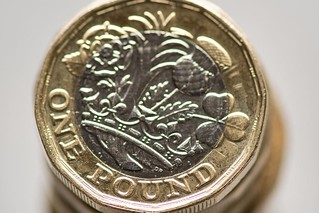 Artist Michael Armitage will design a new £1 coin which will enter circulation next year, Chancellor Rishi Sunak has announced.
Artist Michael Armitage will design a new £1 coin which will enter circulation next year, Chancellor Rishi Sunak has announced.
The new design for the reverse or tails
side of the coin will mark its 40th anniversary and it will be revealed later this year.
FAKE CANADIAN FAKE TWO-DOLLAR COINS SEIZED
Speaking of counterfeit circulating coins, this article discusses fake Canadian two-dollar coins, or "toonies". -Editor
A Richmond Hill man is facing charges after RCMP identified and seized 10,000 counterfeit toonies.
The charges stem from an investigation dating back to last summer, when the Royal Canadian Mint discovered an ongoing counterfeit currency problem through their random sampling process. From there, the Greater Toronto Area's Trans-National Serious and Organized Crime Section opened an investigation that focused on finding those who were involved in the circulation of the faulty coins.
LEPROSY COINS
On the American Numismatic Association website the Coleccionistas de Monedas's Blog has a nice article about coins and tokens related to leprosy. Check it out - here's an excerpt. See the complete article online. -Editor
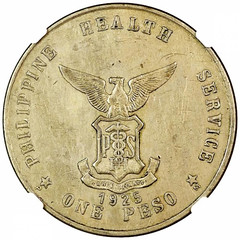 Leprosy is perhaps the most feared disease in history, reported in millenary texts and universally popularized by its numerous mentions in the Bible. However, although this bacillus is not transmitted by contact, but through the airways when breathing, coughing or talking, different countries minted coins for prophylactic purposes since the early twentieth century for the exclusive use of leprosaria located in their territory.
Leprosy is perhaps the most feared disease in history, reported in millenary texts and universally popularized by its numerous mentions in the Bible. However, although this bacillus is not transmitted by contact, but through the airways when breathing, coughing or talking, different countries minted coins for prophylactic purposes since the early twentieth century for the exclusive use of leprosaria located in their territory.
This disease led to millennia of segregation and isolation measures for those who had the misfortune to suffer from it. In this article we will provide all the information on this phenomenon and the best known coins that were minted for this purpose.
ISRAEL PRESENTATION MEDALS
Aaron Oppenheim writes:
"After reading Michael Oppenheim's (no relation!) contribution to last week's E-Sylum I found a couple of examples in my collection that would fall into the same category."
Thanks. Here are Aaron's images and descriptions. Great medals! -Editor
THE BOOK BAZARRE
FINDING AN OLD SAFE
Wouldn't we all love to find an old safe in the old house we just bought? I followed a clickbait headline to this article about such a find. -Editor
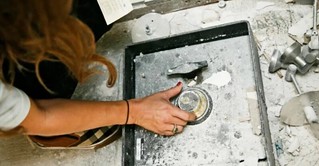 Once Jack had moved the old cabinet away, he noticed something in its place -- a circular notch on the floor. There was a handle on the item on the floor.
Once Jack had moved the old cabinet away, he noticed something in its place -- a circular notch on the floor. There was a handle on the item on the floor.
It seemed like a giant plug built into the floorboards, but why? He pulled hard on the plug to reveal something that had been hidden for a long time.
THE GEOMETRIC LATHE
Franklin Noll publishes a wonderful blog featuring short items on numismatic and monetary history. The May 2, 2022 piece pictures a rare and important device in banknote making - the geometric lathe. With permission, we're republishing it here. Thanks! Found via News & Notes from the Society of Paper Money Collectors (Volume VII, Number 47, May 10, 2022). -Editor
MAKING ART OUT OF INFLATION
In the whatever-floats-your-boat department is this New Yorker article about a Swiss artist exhibition about hyperinflation. -Editor
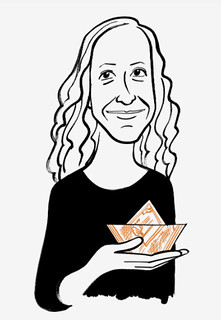 Carla Zaccagnini was seated on a bench the other day, riffling through a pile of cash.
Carla Zaccagnini was seated on a bench the other day, riffling through a pile of cash. I've been collecting money that's not in circulation anymore,
she said, looking up from stacks of bills sheathed in cellophane. So, currencies that are dead.
It was five days before Zaccagnini's first solo exhibition in the United States would open, at Amant, a nonprofit art space in Brooklyn, and three days before the U.S. Bureau of Labor Statistics would announce that consumer prices had risen 8.5 per cent in the past year, sparking panic about the cost of broccoli and gasoline. Zaccagnini's show, Cuentos de cuentas / Accounts of Accounting,
is based on her childhood in Argentina and Brazil in the nineteen-seventies and eighties, when hyperinflation drove people to hoard U.S. dollars. Zaccagnini recalled that grocery workers spent hours walking the aisles, replacing price tags throughout the day as prices went up.
LOOSE CHANGE: MAY 20, 2022
Here are some additional items in the media this week that may be of interest. -Editor
In the cut-out-the-middleman department, collectors in Washington, D.C. can visit the reopened coin store at the U.S. Mint headquarters. Hurry there and get your "swag bag". -Editor
The United States Mint is reopening its Washington, D.C. Coin Store on May 16, 2022. The store had been closed for more than two years to reduce the risk of Mint employee exposure to COVID-19.

Having customers coming back to the store is a great opportunity for the Mint to interact with the numismatic community,
said Matt Holben, Associate Director of Sales and Marketing. Listening to our customers' feedback, observing their reactions, and engaging in conversation with customers lead to better product development.
The store will offer a wide variety of United States Mint coins and medals for sale. The initial inventory will include limited quantities of some 2021 American Eagle gold and silver coin products.
The store will have sidewalk signage outside of the entrance letting customers know where to enter into the building.
The store is giving away swag bags
to the first 50 people who make a purchase.
To read the complete article, see:
United States Mint to Reopen Washington, DC Coin Store
(https://www.usmint.gov/news/press-releases/mint-to-reopen-washington-dc-coin-store)
Other topics this week include coin conservation, and the killer of dealer Paul Edmonds. -Editor
FEATURED WEB SITE: RNUMIS
This week's Featured Web Site is the updated rNUMIS, an extensive numismatic digital library.
In 2012 rNumis was launched by Dr. Steve Moulding as a website that sold coin auction catalogs and fixed price lists, with a primary (but not exclusive) focus on Ancient Greece. We still do that (see LITERATURE FOR SALE in the main menu).
Behind the scenes - and over the past 9 years - we have been creating an extensive numismatic digital library. This library provides the material for our numismatic databases and these databases, in turn, provide the data for our numismatic research tools, some of which will be offered here. One of our main goals, for example, is an online resource for provenance research.
So while we will continue to sell physical catalogs that we no longer need, the website is being transitioned to the research site we always wanted. We still have an enormous amount of work to do, building the website and the research tools, and especially in populating the Greek Coins database, but we are excited to be moving in this direction and will report our progress here.
https://www.rnumis.com/
To read the earlier E-Sylum article, see:
MORE WEBSITES FOR RESEARCHING ANCIENTS
(https://www.coinbooks.org/v25/esylum_v25n01a10.html)

